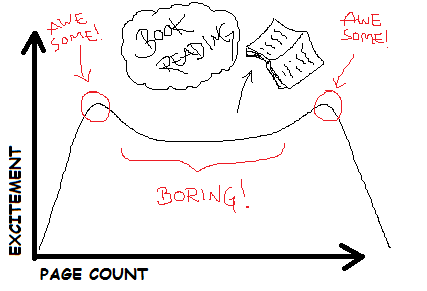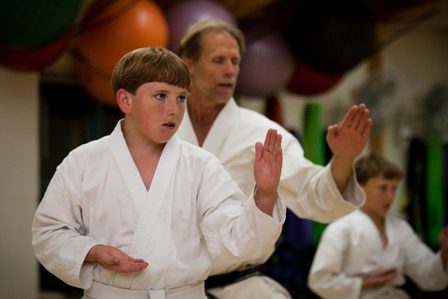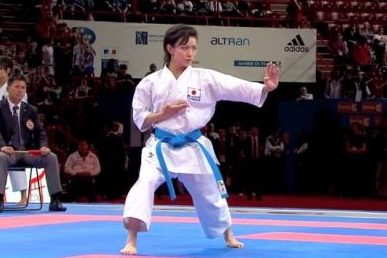Somebody died and made me king, emperor and dictator-for-life of Karate therapy online.
Here’s my latest patient, a young warrior by the name of Alex-san.
Dear Jesse,
First and foremost, thank you very much for keeping this blog! It really is quite brilliant, and quite rare: an excellent karate-ka willing to share the vast expanse that is his knowledge/experience publicly for all to see, without political/style based bias or any of the stuff that generally subtracts from our karate. For that, I thank you ^__^
Oh yeah! Japanese smiley, now we’re talking!
Now, onto my question sorry. I won’t explain how I’ve ended up where I am (it’s after midnight and I would rather not make this any more of any essay than it has to be), but I am an 18 year old 3rd kyu (I first entered the dojo when I was 9). I train as often as I can, and think I’m making a fair bit of progress, but I obviously have more than I could possibly imagine yet to learn still.
This is where my question comes into play: what should someone at my level be focusing on? I believe wholeheartedly that to consider myself a student of karate, I need to dedicate fairly equal time to kihon, kata, and kumite and become well rounded, but I often hear things like “sanchin training is paramount!” or “have you tried application x in jiin? It kicks ass!”. This is all stuff that is (probably) still beyond me.
So; in your humble opinion, what should someone at my level be keeping in mind and working on primarily at all times?
Thank you very much,
Alex
No.
Thank you, Alex.
You’re posing a great question, which can be analyzed from many perspectives.
For instance, for a historical perspective on how much time and focus one should spend on the various aspects on Karate, we needn’t look further than Shito-ryu founder Mabuni Kenwa’s article “Practise Kata Correctly”, where he strongly advices that one should focus 50% on kata (with its study and analysis, ie. bunkai) and 50% on “other” things, like kumite, makiwara, conditioning etc.
And hey, who are we to disobey that?
Then, of course, we have the relatively modern 3K (kata, kihon, kumite) model of thinking, where all three parts should ideally be practised equally to aquire perfect harmony and balance (which is what Hirokazu Kanazawa speaks of in The Karate Code. I promise, it’s coming soon!).
However, with that being said, I don’t really think there is no need to follow Mabuni’s advice, Kanazawa’s advice, or any other master’s advice for that matter.
Not in this case.
Because I don’t think that’s the real issue here.
Alex-san… I think your problem lies deeper.
Let me ask you something: Have you ever read a really fat book? Like, Dostoyevsky’s Crime and Punishment or perhaps Anna Karenina (which is a total chick book by the way)? You know, one of those books that you could easily kill a man with if you’d chuck it in someone’s head?
Well, then you surely know that there is a huge difference in how you perceive your reading experience depending on what page you’re on.
Know what I mean?
For instance, when you’re just beginning to read the first pages of a book, everything goes very fast, right? It’s exciting. You turn pages like there’s no tomorrow, flap, flap, flap, and by the time you’re finished for the day you’ve probably covered a respectable amount of pages. Maybe from 0 to 200! Wow!
Fast forward three weeks, and you’re probably in the middle somewhere. You’re still reading the same book though, in the exact same pace, but somehow it now seems to take ages to finish each chapter. Boooring! You’re stuck with little noticeable progress. In fact, sometimes it even feels like a chore. And this book used to be awesomeness redefined!
Then, all of a sudden, you’re approaching the end. Boom! Things suddenly speed up again, similar to when you first started out reading the book. Flap, flap, flap! You tirelessly slay page after page, like a Spartan warrior on the battlefield – until the book finishes. And just as quickly as it started, it’s all over.
Here’s a graph:
[Science nerds: yes, I know it’s not accurate. Sue me.]
The exact same dilemma, problem, paradox or whatever you choose to label it applies to Karate.
For everyone.
Let me tell you something: I am actually writing this in an airplane. Why am I writing? Shouldn’t I be sleeping instead or listening to some music? I would like to say “Because I’m a nice person who cares about you enough to spend every moment of my spare time to write free articles on Karate”, but that’s not the case. Truthfully, it’s because I’m bored as hell. And I don’t want to drain the batteries of my iPhone!
You see, although I know that the plane is flying close to Mach 0.8, it doesn’t excite me at all. But that’s almost the speed of sound! I’m “stuck” in the middle of the book so to speak. I mean, it kind of even feels like the plane is standing still. Actually, when I peek out the window it looks like we’re standing still!
Paradoxically enough, the fastest part of the flight seems the slowest.
(Compare that to the excitement of the starting and landing.)
Just like reading a thick book.
Just like practising Karate.
So what I’m guessing is; Alex-san’s real problem isn’t what he needs to “focus” on. Keep focusing on everything; if you want to become a true expert you can’t cherry pick anyway. As Alex-san writes himself, “dedicate [a] fairly equal time to kihon, kata, and kumite”. To use my present situation as an example again; Alex’s real problem might be that he’s in the middle of the flight.
And he’s wondering if changing seats will make the plane travel faster.
Of course you all know the answer to that.
This stage is one of the greatest challenges every practitioner faces, whether it’s in playing football, Karate, golf, guitar, taekwondo or baseball. Pushing through those periods where progress seems slow. Everyone has them now and then, and it’s probably safe to say that these stages are the ones where most people tend to quit, or look for “new things to focus on” as a desperate call for help.
But that is a grave mistake.
Almost all improvement – intellectual one especially – progresses at a roughly linear rate. In monetary terms, this would be like increasing your savings by exactly $10 every day. Therefore, what happens is that even though the absolute rate of improvement doesn’t change, the relative rate inevitably declines to very near zero — to the point that it is completely imperceptible! That’s where progress seems non-existent.
The better you get, the less you seem to get better.
(I would do a graph but my MS Paint skills would just blow everyone’s socks off.)
Thats why the best have always been the ones who never gave up.
In the beginning, when $10 the next day suddenly becomes $20, you get all excited, like: “Whoa! It doubled!”. And the next day, it’s tripled! That’s the fun part about being a beginner in everything, and also a great reason to keep a beginners mind. But later on, when $100,010 becomes $100,020, you paradoxically feel let down and sad instead, like: “Hey, my money’s practically standing still! All this hard work for nothing?!”.
Isn’t it weird?
You have made a buttload of money since you started, yet you feel worse rather than better!
You have increased punching speed by 3%, depth of stances by 2 inches, height of kicks by 1 foot and loudness of kiai by 5 decibels; yet you hardly notice it. But your Karate has improved.
And continues to improve.
It’s that same graph again.
 Just change “page count” to “money count”.
Just change “page count” to “money count”.
Or “Karate progress”.
So, I guess what I’m trying to say is this:
- Keep.
- Practising.
- Everything.
- All the time.
Wanting to change focus in training is often a sign that you’re bored. And the main reason to why many people are bored is simple: They can’t see progress anymore.
But this is a good sign.
Having a hard time seeing progress means you have pushed through the first “top” (refer to the graph) and are now riding the “dip”. This means you have come past the beginner’s stage, and are on your way to a higher place of learning. Refer to Shu-Ha-Ri for a more Japanese viewpoint on these cycles. As long as you keep moving, you are progressing. No, it might not be noticeable to you, but – to use the money example again – to somebody who saw you at $50,000 there will be a big difference when they see you again at $75,000.
We just tend to have a hard time seeing progress when we’re stuck in it ourselves.
But you don’t need to see it, as long as you know it
The problem is, some people don’t know it. And even when told, they demand to see proof of it. Well, as they say the “proof is in the pudding”.
So just keep eating, Alex-san.
Just keep eating…
______________
That’s it for this time!
Tune in next week, as Dr. Karate takes on a new case in… W-what?! I’m not a real doctor? B-b-but… but…
…
…



6 Comments